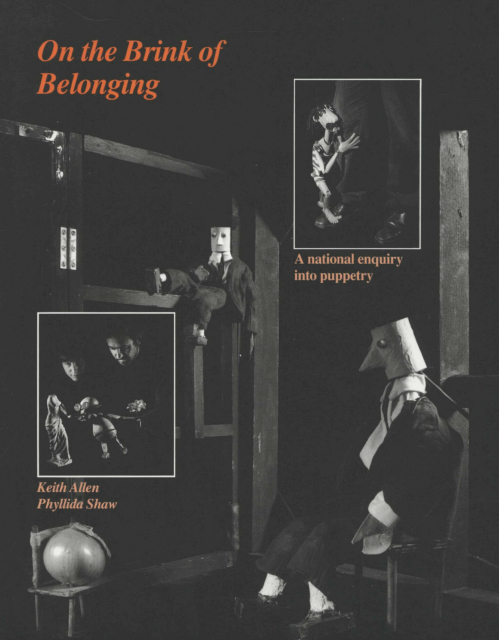On The Brink Of Belonging

A national enquiry into puppetry
Keith Allen and Phyllida Shaw
1992
B/w illus
ISBN 978 0 903319 60 7
‘When you write for puppets, you have to remember two things: it’s easier for the little buggers to grow a second head than to answer a telephone, and it’s the theatrical form that celebrates innocence.’ So says Jerry Juhl, head writer for The Muppets.
The power and pleasure of puppetry are among contemporary theatre’s best kept secrets. Public perceptions, skewed by ignorance and narrow vision, still site puppetry firmly in the sphere of ‘kiddies’ theatre’, ‘light entertainment’ or ‘low tech art’ – an uncritical hour’s diversion at the weekend, a craft skill for teaching art or science, a vague memory of sand and candyfloss.
Puppetry rejects conventions that seek to restrain it in the booth, on the street, or behind the proscenium. It habitually breaks out in libraries, clubs, schools, art centres, beaches, community halls, fairs, parks and private houses. In one guise or another, puppetry can be found almost anywhere.
The Gulbenkian Foundation set out to discover the reality of being a puppeteer in the UK and Ireland in 1992. Where do they work? Who employs them? Are there more men than women working as puppeteers? What is television’s influence on puppet theatre? The answers it found are the substance of this report.
Keith Allen is an arts administrator and consultant. On graduating from Sussex University, he spent two years touring the Antipodes with a stage hypnotist, before joining Battersea Arts Centre as production manager. He took off to West Virginia for three months to help establish an arts centre before returning to London to work as temporary administrator of the Puppet Centre; he stayed for four years. He has been working freelance since 1990.
Phyllida Shaw is a researcher and writer specialising in arts policy and management. She has worked extensively for the British arts funding system, arts organisations, central and local government, higher education institutions and charitable trusts and foundations. She is an adviser to the Baring Foundation on arts in education and the community and is a regular contributor to Classical Music and Artists’ Newsletter.
